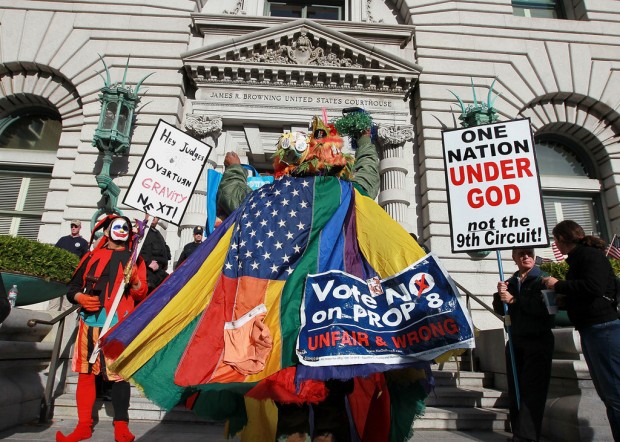
For the better part of the past decade, California has been engaged in an epic battle over, well, getting engaged. The multiple court cases, votes, legal victories, reversals, protests, celebration and more protests have kept same-sex couples in an ongoing state of marital limbo and made it downright confusing to keep track of where things stand.
The latest
On December 7, after months of anticipation, the U.S. Supreme Court announced that it would tackle the issue of same-sex marriage by examining two different cases. The first case involves deciding on the constitutionality of the Defense of Marriage Act (DOMA), and will examine whether the government can deny federal benefits to legally married same-sex couples.
In a more surprising move, the court also decided to review a lower court's decision in February that ruled California's Proposition 8 unconstitutional on the grounds that it violates the U.S. Constitution's Equal Protection Clause. Following that earlier ruling, opponents of gay marriage appealed to the Supreme Court, who will now likely hear arguments next spring. Its decision on the issue could have national ramifications in determining whether or not gay couples have a constitutional right to marry.
How we got here
It’s been a long, strange trip to say the least. For the sake of brevity, let’s start in 2008 (although the battle got heated years before that – just scroll through this interactive timeline for all the gritty details). In June of that year, counties began issuing marriage licenses to same-sex couples. This started a month after the California state Supreme Court (not federal) overturned the existing ban, The court ruled that marriage was a fundamental right that could not be denied based on sexual orientation. And over the next six months, thousands of same-sex couples in California got married.
A short-lived celebration
But the honeymoon was cut short during the 2008 presidential election that November, when just over half of California voters approved a ballot measure known as Proposition 8 (which supporters labeled the "California Marriage Protection Act"). The measure trumped the court’s earlier decision and amended the state's Constitution by adding the provision that "only marriage between a man and a woman is valid or recognized in California." Interestingly, the same court also later rejected efforts by gay marriage advocates to strike down the ban.
Bringing it to the feds
Less than two years after Proposition 8 passed and was upheld by the California Supreme Court, the tables shifted yet again. The case was brought to a federal court in San Francisco, and in 2010 presiding Judge Vaughn Walker ruled that the ban – although popularly approved by voters – was unconstitutional. In the decision, he wrote that the Equal Protection Clause of the U.S. Constitution (in the Fourteenth Amendment) guaranteed equal rights to same-sex couples, including the right to marry.